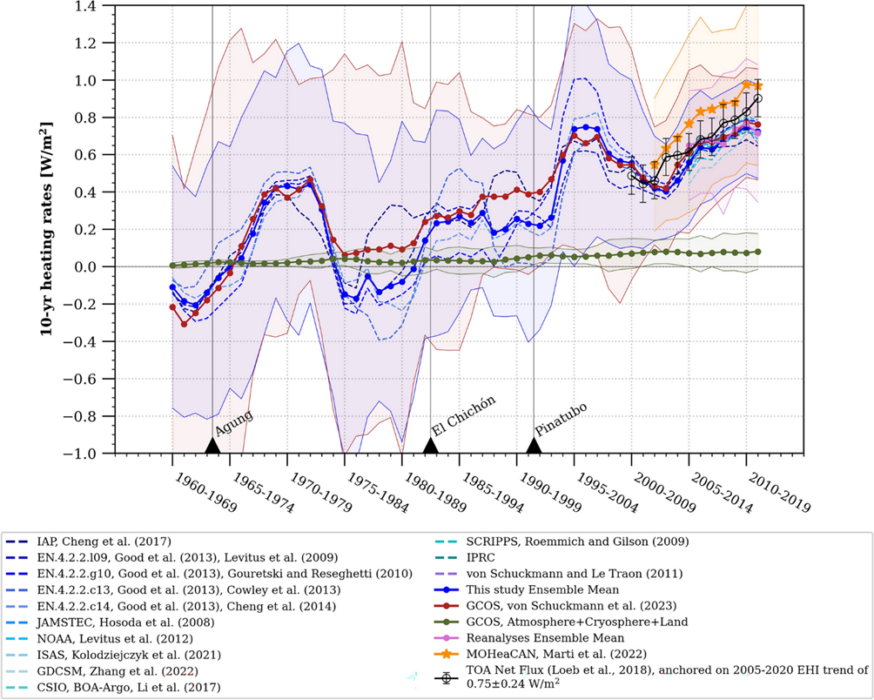The international community grapples with the reality of planetary warming, a phenomenon whose far-reaching implications are notably borne heavily by the Ocean, exerting profound impacts on both the environment and humanity at large. But where does the excess heat from human activities go? And how fast is the planet warming? Is it a steady progression, or is it accelerating? Mercator Ocean International (MOi)’s expert oceanographers shed light on these important questions in two studies released in 2023, expanding our understanding of Earth’s warming.
Earth Energy Imbalance: where does the excess heat go?
According to the Intergovernmental Panel on Climate Change (IPCC), human activities are responsible for approximately 1.1°C of global warming beyond pre-industrial levels. These activities, including the release of greenhouse gases, aerosols, and their precursors, have induced an Earth Energy Imbalance (EEI). This imbalance signifies that, mainly because of the greenhouse effect, less energy is escaping the top of the atmosphere compared to the amount entering the Earth’s climate system through solar radiation. Therefore, the Earth climate system is accumulating energy, predominantly in the form of heat. According to key findings of a recent study led by MOi’s Karina von Schuckmann, oceanographer and expert in ocean climate monitoring, approximately 89% of this accumulated heat is stored in the Ocean, while around 6% contributes to warming the land, about 4% is involved in melting the cryosphere (encompassing areas of ice and snow), and roughly 1% warms the atmosphere.

How fast is our planet warming?
As explained in the study Heat stored in the Earth system 1960–2020: where does the energy go? (Karina von Schuckmann et al., 2023), the Ocean is the most important heat reservoir of our planet. Our oceanographers Audrey Minière and Karina von Schuckmann delved into the topic by further investigating the pace of the Earth’s warming. Their recently published paper in Nature, entitled provides compelling evidence that the Earth system has been cumulating heat at an increasingly faster pace since 1960.
The researchers focused on the rates of Ocean heat content, a variable indicating the energy absorbed and stored by Ocean. By using the best available data from multiple sources, including satellites and in situ technology, they compared the acceleration rates of different decades, from 1960 to 2020. Key findings from the study highlight that Ocean warming has been significantly accelerating since 1960, at a rate of 0.15 ± 0.05 (W/m2)/decade. This has resulted in a significant contrast in warming rates, with a difference of 0.91 ± 0.80 W/m2 observed between the periods of 1960–1970 and 2010–2020.
In other words, the Ocean is absorbing the largest part of the excess anthropogenic heat cumulating in our planet, causing its warming. This warming is occurring at an accelerated pace since 1960, with increasing Ocean warming rates occurring decade after decade. In comparison, the planet’s other heat reservoirs (i.e. the land, the cryosphere, and the atmosphere) all combined have shown parallel acceleration, reaching a pace of 0.013 ± 0.003 (W/m2)/decade.

Ocean warming and its impacts
As the Ocean plays a pivotal role in Earth’s climate, its warming carries significant and far-reaching impacts on various aspects of our planet. Some consequences of Ocean warming include alterations in currents, sea level rise, reduced carbon solubility in Ocean water, and profound effects on both marine ecosystems and the Earth’s cryosphere. According to the IPCC’s Special Report on the Ocean and Cryosphere in a Changing Climate (SROCC), without substantial emissions reductions, sea level rise could accelerate, potentially reaching 1.1 meters by 2100.
In Robust acceleration of Earth system heating observed over the past six decades, the researchers also state that the Earth’s long-term warming aligns with the rise in human-induced CO2 concentrations and a decrease in aerosol concentration during this time. Yet, further investigations are urged to firmly define the causes of these changes, particularly in the last two decades, where warming has nearly doubled compared to the long-term average.
The acceleration of our planet’s warming, particularly in the Ocean, highlights the urgent need to understand the underlying physical drivers and impacts of these unprecedented changes on the Earth’s system.
Useful links
- Access the paper published in Nature Scientific Reports: Robust acceleration of Earth system heating observed over the past six decades
- Minière, A., von Schuckmann, K., Sallée, JB. et al. Robust acceleration of Earth system heating observed over the past six decades. Sci Rep 13, 22975 (2023). https://doi.org/10.1038/s41598-023-49353-1
